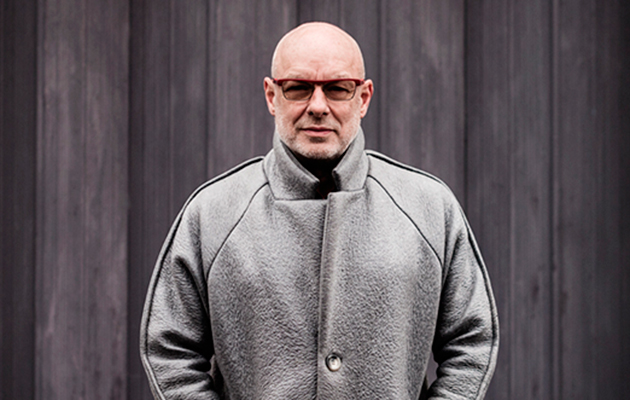
How do you normally feel at the end of a project like this? Are you happy with this record?
You don’t always like records when you finish them. Sometimes you think, ‘I just want to not bloody hear it again for a long time.’ Especially records you’ve worked on for a long time. Productions that I worked on for a year or two years, by the end, you’re really sick of it. It’s like cooking. When you’re cooking something elaborate, you’re hours smelling the thing. By the time it’s done, you don’t want to eat.
What was the catalyst for The Ship?
It started with a request from a Swedish electronic music studio, Fylkingen, to make a sound installation for them. They said, ‘We’ve got lots of channels of sound. So if you want to make it 16 channels, we can do it.’ I started out making a piece of music which was only music, no voices. I did it in here, actually, because I have lots of speakers here of all different kinds stuck up in various places. The piece was in C and to my surprise one evening I found that I could sing a low C, which I’ve never been able to do before. It’s a consequence of getting older. As you get older, your voice adds some range at the bottom and loses quite a lot more at the top. I had a new mic, which seemed to flatter that sound. So I started singing, Just sounds at first. It was nice, having a voice in this piece. Putting together an ambient piece with something like a song was something I’d never done before.
It’s good to hear you singing again. I heard you sing live at Damon Albarn’s gig at the Albert Hall in November, 2014.
That was a very interesting experience for me. I didn’t do warm up. I was sitting down in the back, reading, while the show was going on. I knew I was the last song [“Heavy Seas Of Love”], but when the time came, I thought, ‘Christ, I suppose I should have warmed up.’ I just walked on and this voice came out of me that was so unexpectedly confident.
When was the last time you’d sung on stage at a rock gig prior to that?
Oh, blimey. It’s a long time. I think with Rachid Taha [Stop The War benefit concert; November 2005].
How did you get Peter Serafinowicz’ involved for “The Hour Is Thin”?
I put in a description of seeing the Titanic go down from one of the lifeboats into the Markov Generator. I took quite a lot of pornographic songs from the First World War. Soldiers used to take music hall songs and change the words so they were very, very dirty. I put some of those in. Having done it, I was sitting at this table, and I thought, ‘What voice would this be?’ Peter Serafinowicz! I rang him up, and he said, ‘Oh, I’m just round the corner actually.’ He came in and had read that within 20 minutes of it being finished. It was fantastic.
The First World War was the first mechanized war, while the Titanic was meant to be state of the art. Are you saying that you’re anti-technology, or is this a way of emphasising how pro-human you are?
I’m certainly not anti-technology. Technology is the way we extend our senses and our reach. Incidentally, technology is the only way I could possibly have ever been a musician! No, it’s to do with noticing a pattern that keeps repeating the connection between power and vulnerability – or power and paranoia, shall we say. The Titanic and the First World War both represent a point at which empires had reached a level of hubris and arrogance and confidence that made them think that they could do anything and they would succeed at it. You can see it most recently in America after 9/11, where you had a country that felt that its power was not only stable and permanent but also historically inevitable. The whole project was in ruins; and further ruined by the invasion of Iraq. So that to me is a direct parallel to the First World War, where these empires had reached a state of stability and scale and security – just like the Titanic. They all thought they were unsinkable, and they sunk. Four empires disappeared during the First World War.
The Ship is a loosely-themed concept album, like Taking Tiger Mountain (By Strategy). How do you view those early albums now?
When I listen back to those things, it makes me realise that we aren’t one person. We get this impression that here’s Brian Eno and he’s been this person for all that time. But actually it hasn’t. It’s been a whole series of different people. I can hear that Brian Eno from 1974 and think, ‘Christ, that really was a different person.’ Some things of course remain the same, but it’s a very tenuous connection between the me of now and the me of then. Much more tenuous than people usually admit to. We’re natural storytellers and we tell our own story as if it happened logically, with cause and effect. But it’s not like that at all. We’re constantly modifying the story to try to accommodate the weird swerves we make in different directions. There comes a point where the embarrassment passes and you just accept this is another person. Then it becomes quite interesting because you think, ‘Oh, yeah. I don’t mind that person. It’s just not the one I thought it was.’



